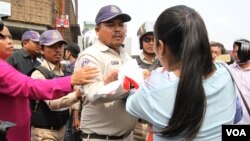Labor leaders in Cambodia have expressed concerns over pressures placed on their freedom to organize and mobilize garment workers following the implementation of a contentious law governing unions earlier this year.
The unionists say the law has also restricted the freedom of workers to form new unions since the law came into effect on May 17.
“The Ministry asks the unions and employee associations, which have already been registered, as well as those which submitted proposals for registration, to fulfill the conditions and properly implement every obligation as stated in the union law,” a statement from the labor ministry released last week read.
It added that the law was “to ensure the protection of rights and legal interests of every citizen” as well as unions and employers.
Yang Sophorn, director of the Cambodia Alliance of Trade Unions, criticized the “fast pace” with which the law was implemented.
“I observe that the main points concerning union rights are being restricted. For instance, related to the rights to peaceful demonstration. Like an article which states that demonstrations can only take place when there’s an agreement among workers of more than 51 percent. So we see that as restricting their rights.”
Kong Atith, secretary of the Cambodia Labor Confederation, said the law had not only restricted unions already in existence, but it had also made it harder for non-unionized workers to form new ones.
“The law worries us concerning its implementation and the bureaucratic process as well as the conditions required by the government, such as financial reports, while the workers also need to fulfill some conditions before forming new unions. And only those with capital can form unions. That’s why it’s difficult for them.”
Labor Ministry officials could not be reached.
The International Labor Organization has expressed concerns over the lack of protections afforded to workers in the law.
Cambodia has more than 3,000 unions, however, the vast majority are inactive.




